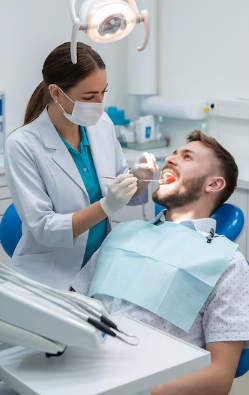What is Bachelor of Dental Surgery (BDS)?
The Bachelor of Dental Surgery (BDS) is a professional undergraduate degree for students aspiring to become dentists.
Recognized by the Dental Council of India (DCI), BDS is the only program in India that allows students to practice as dentists upon completion.
The course is structured to cover both theoretical and practical aspects of dentistry, including the diagnosis, prevention, and treatment of dental diseases.
Eligibility Criteria for Bachelor of Dental Surgery (BDS) Career Option After 12th PCB
To enroll in a BDS program, students must meet specific eligibility criteria. The key requirements are:
- Educational Qualification: Completion of 12th standard with Physics, Chemistry, and Biology (PCB) as core subjects.
- Minimum Marks: At least 50% aggregate in PCB subjects (40% for reserved categories).
- Age Requirement: Candidates must be at least 17 years old by December 31st of the year of admission.
- Entrance Exam: Admission to BDS is primarily based on performance in the National Eligibility cum Entrance Test (NEET), which is mandatory for all dental and medical programs in India.
Entrance Exams for Bachelor of Dental Surgery (BDS) Admission
The NEET (National Eligibility cum Entrance Test) is the sole entrance exam for admission to BDS courses across both government and private dental colleges in India.
NEET is a highly competitive exam, and securing a good rank is crucial for admission to top institutions. Some states may have their counseling process for seat allocation, but NEET scores remain the primary criterion for selection.
Duration and Structure of the Bachelor of Dental Surgery (BDS) Course
The Bachelor of Dental Surgery (BDS) course typically spans five years, including four years of academic study and a mandatory one-year internship. The curriculum is designed to provide a strong foundation in dental sciences, including anatomy, oral pathology, and orthodontics.
Practical training through laboratory sessions, clinical exposure, and community dental programs is an integral part of the course.
Key subjects covered in the BDS curriculum include:
- General Human Anatomy
- General Pathology and Microbiology
- Oral Medicine and Radiology
- Conservative Dentistry and Endodontics
- Orthodontics and Dentofacial Orthopaedics
- Prosthodontics and Crown & Bridge
Internship and Practical Training
The final year of the BDS course involves an intensive one-year rotating internship, where students gain hands-on experience by treating patients under supervision.
This internship is essential for developing practical skills and applying theoretical knowledge in real-world scenarios. Students are also exposed to dental surgeries, preventive dentistry, and public health dentistry during this period.
Top Colleges for Bachelor of Dental Surgery (BDS) in India
India boasts several prestigious dental colleges offering BDS programs. These institutions are known for their experienced faculty, state-of-the-art facilities, and excellent placement opportunities. Here’s a list of some top government and private colleges for pursuing BDS:
- Maulana Azad Institute of Dental Sciences (MAIDS), New Delhi
Scholarships and Financial Aid:
Several scholarship programs are available for meritorious students and those from economically weaker sections. Some of the popular scholarships include:
- National Scholarship Portal (NSP) schemes
- Post-Matric Scholarship for SC/ST students
- State Government Scholarship Programs
Career Options After Bachelor of Surgery (BDS)
Private Sector Jobs After BDS
Graduates with a BDS degree have numerous career options in the private sector. Some of the popular career paths include:
- Private Dental Practitioner: Many graduates set up their dental clinics or join existing practices.
- Dental Consultant: Dental consultants provide expert advice to clinics and hospitals.
- Dental Surgeon: Private hospitals and dental care centers hire BDS graduates as dental surgeons.
- Academic Roles: Teaching in private dental colleges is a viable option for those interested in academia.
Government Jobs After BDS
BDS graduates can also find lucrative career opportunities in government sectors, such as:
- Government Hospitals: Dentists are in demand in various state and central government hospitals.
- Public Health Programs: Dentists can work in community health programs and government-funded dental care initiatives.
- Army Dental Corps: Serving in the Indian Army as a dentist is a prestigious and well-compensated career option.
- Civil Services: BDS graduates can appear for civil services exams like UPSC and enter administrative roles in health departments.
Higher Studies Options After BDS
For those looking to specialize further, BDS graduates can pursue higher studies, such as:
- MDS (Master of Dental Surgery): Specialize in fields like Oral Surgery, Orthodontics, or Periodontics.
- MBA in Hospital Management: A business degree in healthcare management can lead to roles in healthcare administration.
- Fellowships and Diplomas: Short-term specialized training in areas like implantology, cosmetic dentistry, or oral pathology.
Skills Required for a Career in BDS
A successful career in dentistry requires a combination of technical skills and soft skills, such as:
- Manual Dexterity: Precision and skill in handling dental instruments.
- Communication Skills: Effective communication with patients to explain procedures and treatments.
- Empathy and Patience: Dealing with patients’ concerns and ensuring their comfort is key.
- Analytical Skills: Diagnosing dental issues requires critical thinking and problem-solving abilities.
Conclusion
A career in BDS offers a promising future with diverse job opportunities in both the private and government sectors. With the growing demand for dental professionals, pursuing BDS after 12th PCB can be a rewarding choice.
Whether you choose to practice as a private dentist, join a government hospital, or pursue higher studies, the field of dentistry offers significant growth potential.
For more Courses, Details and Career Options after 12th, CLICK HERE


I have not checked in here for some time since I thought it was getting boring, but the last few posts are great quality so I guess I will add you back to my daily bloglist. You deserve it my friend 🙂